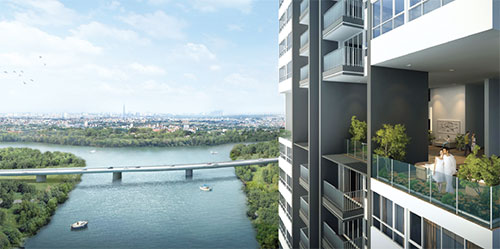Keppel Land’s quality commitment
 With eight operating properties and four under-construction projects in Hanoi, Ho Chi Minh City, Dong Nai and Vung Tau, Keppel Land is one of the most prominent real estate developers in Vietnam. How has the firm contributed to transforming Vietnam’s cityscapes over the last two decades?
With eight operating properties and four under-construction projects in Hanoi, Ho Chi Minh City, Dong Nai and Vung Tau, Keppel Land is one of the most prominent real estate developers in Vietnam. How has the firm contributed to transforming Vietnam’s cityscapes over the last two decades?
Keppel Land is one of the pioneers in Vietnam’s property development business. We are also one of the largest real estate investors with a diverse portfolio of award-winning properties in Hanoi, Ho Chi Minh City, Dong Nai and Vung Tau, including Grade A offices, premier residences, integrated townships and serviced apartments. Today, Keppel Land has a total of 18 licensed projects with a total registered capital of about $2 billion and provision of about 22,000 homes in Vietnam.
Of the 18 projects, eight are completed developments – International Centre, Sedona Suites Royal Park and Vietcombank Tower in Hanoi; Saigon Centre Phase 1, Villa Riviera, Riviera Cove and The Estella Phase 1 in Ho Chi Minh City as well as PetroVietnam Tower in Vung Tau. Meanwhile, construction is ongoing for four projects in Ho Chi Minh City, including phase 1A of Riviera Point, Saigon Centre phases 2 & 3 and an integrated waterfront residential development in South Rach Chiec. We have also begun planning for the other two projects, Saigon Sports City and Dong Nai Waterfront City.
The Keppel brand and quality hallmark have distinguished our quality portfolio of properties and earned us a loyal following in Vietnam. Keppel Land also clinched three awards at the prestigious international Euromoney Real Estate Awards 2012 which recognises the best in the global real estate industry. We were named as the best developer, best residential developer and best mixed-use developer in Vietnam.

Many foreign-backed and domestic real estate projects in Vietnam have been put on a hold due to a flat-lining market over recent years. Yet Keppel Land has maintained progress on its incomplete projects. What are the driving forces behind such a solid commitment given the market’s current woes?
Despite the short term challenges, we remain confident in Vietnam’s long-term growth potential. The country’s young and dynamic population, a growing middle-class and rapid urbanisation will continue to spur demand for good quality homes.
We will continue to leverage our reputation as one of Singapore’s leading property developers with a strong track record in delivering well-planned and well-executed quality office buildings as well as homes in good locations. Our brand and quality hallmark have distinguished our properties and earned us a loyal following among consumers in Vietnam.
Is Keppel Land interested in acquisition opportunities in Vietnam’s real estate market, considering the large amount of distressed assets out there?
We’ll continue to keep a look out for opportunities when they arise.
What will be the next opportunities for Keppel Land in Vietnam in the coming years, especially when the market rebounds? Will you expand your investment portfolio and what segments will you focus on?
Vietnam’s real estate market remains an attractive destination in the long term. The fundamentals of the country have not changed and foreign investors will continue to look to Vietnam or expand their presence here. These will continue to drive demand for all sectors of the property market from homes to offices to service apartments. This is where Keppel Land, with our reputation as one of Vietnam’s leading property developers with a strong track record in quality properties, will meet the demand for investment-grade office buildings and superior homes.
We also see Vietnam’s retail market entering an exciting phase of growth and are confident that phase 2 of the Saigon Centre, Keppel Land’s mixed-use development in Ho Chi Minh City, will meet this rising demand for retail space when it is completed in 2015.
Vietnam and Singapore are expected to sign a bilateral strategic partnership agreement this year. What do you expect from the deal for Keppel Land’s business in Vietnam?
This year marks 40 years of close bilateral ties between Vietnam and Singapore. The highly anticipated signing of agreement between Singapore and Vietnam is also expected to bolster economic and business ties between our countries, as well as open up new directions for co-operation in areas including education, training, finance, defence and security.
There are many opportunities where companies in Singapore and Vietnam can collaborate and partner each other. For instance, Vietnamese companies can tap into the development expertise and financial strength of Singaporean firms, while Singapore companies can leverage Vietnamese knowledge of the local market and their strong network that would otherwise take years for Singapore firms to acquire.
What the stars mean:
★ Poor ★ ★ Promising ★★★ Good ★★★★ Very good ★★★★★ Exceptional
Latest News
More News
- State corporations poised to drive 2026 growth (February 03, 2026 | 13:58)
- Why high-tech talent will define Vietnam’s growth (February 02, 2026 | 10:47)
- FMCG resilience amid varying storms (February 02, 2026 | 10:00)
- Customs reforms strengthen business confidence, support trade growth (February 01, 2026 | 08:20)
- Vietnam and US to launch sixth trade negotiation round (January 30, 2026 | 15:19)
- Digital publishing emerges as key growth driver in Vietnam (January 30, 2026 | 10:59)
- EVN signs key contract for Tri An hydropower expansion (January 30, 2026 | 10:57)
- Vietnam to lead trade growth in ASEAN (January 29, 2026 | 15:08)
- Carlsberg Vietnam delivers Lunar New Year support in central region (January 28, 2026 | 17:19)
- TikTok penalised $35,000 in Vietnam for consumer protection violations (January 28, 2026 | 17:15)
















 Mobile Version
Mobile Version